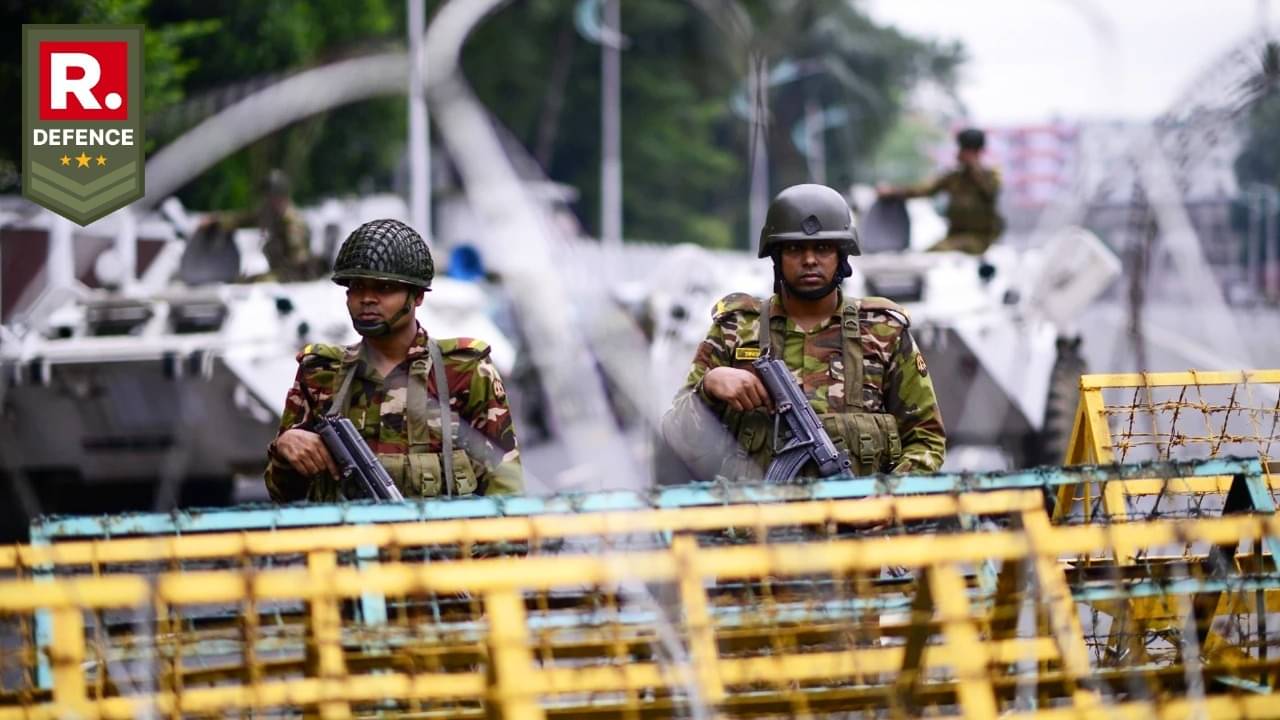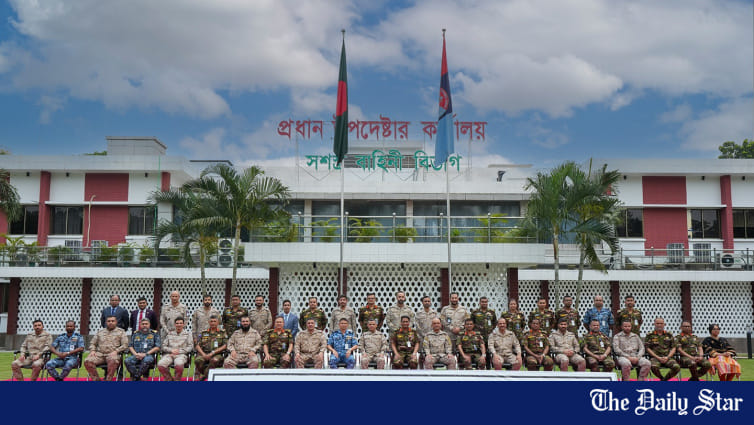Saif
Senior Member
- Joined
- Jan 24, 2024
- Messages
- 16,093
- Likes
- 8,059
- Nation

- Axis Group


Bangladesh Army Delegation Visits China For Tech Transfer Talks; Bayraktar Tb-2s Already Active Along India Border
The current trajectory suggests a second front of strategic pressure could form on India’s eastern flank. A recalibrated security doctrine and urgent defence outreach to Bangladesh are imperative to counterbalance China’s growing influence.
Bangladesh Army Delegation Visits China For Tech Transfer Talks; Bayraktar Tb-2s Already Active Along India Border
China’s defence footprint in Bangladesh, from naval frigates to UAV co-development, is embedding PLA doctrine into Dhaka’s military operations.
Reported by: Yuvraj Tyagi

Bangladesh's drone ties with China and Turkey near Indian borders spark fears of a second surveillance front for New Delhi. | Image: AP
Dhaka, Bangladesh - Bangladesh’s decision to engage in high-level military cooperation with China—India’s primary strategic adversary—marks a significant erosion in the mutual trust built through years of bilateral diplomacy. Despite India’s substantial role in supporting Bangladesh’s Liberation War in 1971 and ongoing investments in infrastructure and defence diplomacy, Dhaka’s outreach to Beijing, especially in dual-use drone technologies, signals a calculated shift away from regional equilibrium and toward opportunistic alignment with external powers.
China's Footprint in Dhaka's Security Sector
China’s historical role as Bangladesh’s primary defence supplier has deepened into a strategic engagement, encompassing naval transfers (like Type 053H3 frigates), submarine sales, and now, UAV co-development. By opening doors to Chinese tech transfers and training protocols, Bangladesh risks embedding the PLA’s influence into its operational doctrines—something India cannot afford in its own neighbourhood.

The December 2024 deployment of Bayraktar TB-2 drones along the India-Bangladesh border in Meghalaya represents a tactical precedent with long-term implications. That these drones reportedly flew 20+ hour reconnaissance sorties—well beyond standard patrol parameters—suggests a deliberate effort by Bangladesh to test Indian radar and border surveillance tolerances. If normalized, such behaviour could lead to a strategic recalibration of India’s eastern border postures, stretching already-thin assets across more sectors.
Strategic Implications for India’s National Security Posture
The deployment of high-end Turkish drones by Bangladesh near India's northeast increases the probability of intelligence vulnerabilities. Bayraktar TB-2s are capable of capturing real-time ISR (intelligence, surveillance, reconnaissance) data with encrypted data links. Their operations close to India’s critical Siliguri Corridor and Assam-Meghalaya belt raise concerns about inadvertent or intentional surveillance leakage. Any cross-data sharing with Chinese or Turkish intelligence would exacerbate this threat.

India already faces massive troop deployments and infrastructure strain in Eastern Ladakh due to the PLA’s assertiveness. A second vector of military-technological pressure from the East (Bangladesh), especially one aligned with China’s interests, creates a scenario akin to a "pressure pincer." This forces India to allocate disproportionate assets along the Meghalaya–Mizoram–Tripura belt, which has traditionally been a low-intensity frontier.
Bangladesh’s growing maritime security engagements with China and Turkey could culminate in enhanced surveillance or even maritime drone deployments in the Bay of Bengal, an area where India seeks naval dominance. Given that China already operates dual-use ports in Gwadar and Hambantota, any future PLA presence in Chittagong or Mongla—under the guise of technical assistance or UAV stationing—would severely erode India’s eastern naval edge.
Missed Opportunities in India’s Bangladesh Policy
India’s diplomatic overtures have often focused on connectivity, energy exports, and infrastructure aid, but have lacked depth in joint military development, leaving space for powers like China and Turkey to step in. The absence of meaningful co-production agreements, drone technology transfers, or counter-terrorism drills with Dhaka has diminished India’s relevance in Bangladesh’s military calculus.
China’s approach is comprehensive: it combines technology transfers, defence loans, and political support, tailored to appeal to smaller nations’ desire for strategic autonomy. India has neither matched this scale nor sophistication. Bangladesh’s latest push for AI-based indigenous drone development with Chinese assistance reveals how New Delhi is getting outpaced in its own backyard.
Bangladesh’s pivot to China and Turkey for military technology—especially in the drone warfare domain—is a strategic inflexion point for Indian policymakers. It demands a calibrated rethinking of India’s eastern security doctrines, backed by urgent initiatives to re-engage Dhaka through high-value military-industrial cooperation, joint exercises, and targeted technology-sharing. Failing to do so will not only weaken India’s influence in its eastern flank but also open the door for a permanent second front of strategic surveillance vulnerability—at the very doorstep of the Indian heartland.
China’s defence footprint in Bangladesh, from naval frigates to UAV co-development, is embedding PLA doctrine into Dhaka’s military operations.
Reported by: Yuvraj Tyagi
Bangladesh's drone ties with China and Turkey near Indian borders spark fears of a second surveillance front for New Delhi. | Image: AP
Dhaka, Bangladesh - Bangladesh’s decision to engage in high-level military cooperation with China—India’s primary strategic adversary—marks a significant erosion in the mutual trust built through years of bilateral diplomacy. Despite India’s substantial role in supporting Bangladesh’s Liberation War in 1971 and ongoing investments in infrastructure and defence diplomacy, Dhaka’s outreach to Beijing, especially in dual-use drone technologies, signals a calculated shift away from regional equilibrium and toward opportunistic alignment with external powers.
China's Footprint in Dhaka's Security Sector
China’s historical role as Bangladesh’s primary defence supplier has deepened into a strategic engagement, encompassing naval transfers (like Type 053H3 frigates), submarine sales, and now, UAV co-development. By opening doors to Chinese tech transfers and training protocols, Bangladesh risks embedding the PLA’s influence into its operational doctrines—something India cannot afford in its own neighbourhood.
The December 2024 deployment of Bayraktar TB-2 drones along the India-Bangladesh border in Meghalaya represents a tactical precedent with long-term implications. That these drones reportedly flew 20+ hour reconnaissance sorties—well beyond standard patrol parameters—suggests a deliberate effort by Bangladesh to test Indian radar and border surveillance tolerances. If normalized, such behaviour could lead to a strategic recalibration of India’s eastern border postures, stretching already-thin assets across more sectors.
Strategic Implications for India’s National Security Posture
The deployment of high-end Turkish drones by Bangladesh near India's northeast increases the probability of intelligence vulnerabilities. Bayraktar TB-2s are capable of capturing real-time ISR (intelligence, surveillance, reconnaissance) data with encrypted data links. Their operations close to India’s critical Siliguri Corridor and Assam-Meghalaya belt raise concerns about inadvertent or intentional surveillance leakage. Any cross-data sharing with Chinese or Turkish intelligence would exacerbate this threat.
India already faces massive troop deployments and infrastructure strain in Eastern Ladakh due to the PLA’s assertiveness. A second vector of military-technological pressure from the East (Bangladesh), especially one aligned with China’s interests, creates a scenario akin to a "pressure pincer." This forces India to allocate disproportionate assets along the Meghalaya–Mizoram–Tripura belt, which has traditionally been a low-intensity frontier.
Bangladesh’s growing maritime security engagements with China and Turkey could culminate in enhanced surveillance or even maritime drone deployments in the Bay of Bengal, an area where India seeks naval dominance. Given that China already operates dual-use ports in Gwadar and Hambantota, any future PLA presence in Chittagong or Mongla—under the guise of technical assistance or UAV stationing—would severely erode India’s eastern naval edge.
Missed Opportunities in India’s Bangladesh Policy
India’s diplomatic overtures have often focused on connectivity, energy exports, and infrastructure aid, but have lacked depth in joint military development, leaving space for powers like China and Turkey to step in. The absence of meaningful co-production agreements, drone technology transfers, or counter-terrorism drills with Dhaka has diminished India’s relevance in Bangladesh’s military calculus.
China’s approach is comprehensive: it combines technology transfers, defence loans, and political support, tailored to appeal to smaller nations’ desire for strategic autonomy. India has neither matched this scale nor sophistication. Bangladesh’s latest push for AI-based indigenous drone development with Chinese assistance reveals how New Delhi is getting outpaced in its own backyard.
Bangladesh’s pivot to China and Turkey for military technology—especially in the drone warfare domain—is a strategic inflexion point for Indian policymakers. It demands a calibrated rethinking of India’s eastern security doctrines, backed by urgent initiatives to re-engage Dhaka through high-value military-industrial cooperation, joint exercises, and targeted technology-sharing. Failing to do so will not only weaken India’s influence in its eastern flank but also open the door for a permanent second front of strategic surveillance vulnerability—at the very doorstep of the Indian heartland.




































